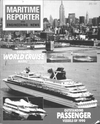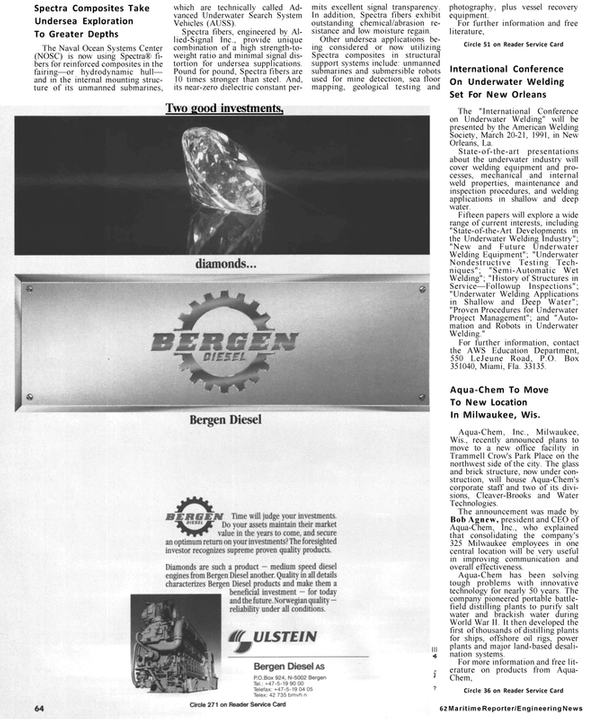
U.S. Merchant Fleet Development Urged By Shipping Executive At New Orleans Conference
Philip Shapiro, president and CEO of Liberty Maritime Corp. and Liberty Shipping Group, New York, offered a number of prescriptions to modernize and strengthen the U.S.- flag liquid and dry bulk fleet when speaking recently at a maritime conference in New Orleans, La.
"U.S.-flag shipping can once again become a dominant force on the world's oceans within today's fiscal constraints,"Mr.Shapiro contended, "[and] this can be accomplished only as long as realistic and politically achievable goals are pursued." One mechanism Mr. Shapiro recommended to encourage modernization and expansion of the fleet is to lower capital cost. He remarked, "The U.S.-flag fleet cannot at this time compete in a completely free and open system—U.S.
costs will necessarily be higher than our foreign competitors. However, given productivity levels, currency devaluations, state-of-the-art vessels, and union cooperation, crew costs are really not much higher in the United States now than in many other countries, albeit that there remain certain foreign crews that we will never be able to compete with." To strengthen the U.S. merchant fleet, Mr. Shapiro suggested increasing to 100 percent U.S.-flag cargo preference requirements, currently at 75 percent for agriculture cargoes, such as P.L. 480/Food for Peace.
"The International bulk fleet currently contains some 4,700 dry bulk ships. The U.S. is the world's largest bulk commodity trader and yet its U.S.-flag dry bulk fleet numbers barely 20 vessels. Cargo preference is virtually the only remaining support program for U.S.-flag bulk shipping. Without a necessary stream of cargo to support those ships, there is little doubt that we would not have any dry bulk vessels," he asserted.
Mr. Shapiro went on to note the importance of a U.S.-flag fleet for national security, stating that "the primary requirement is that the vessel be U.S. documented, and thus U.S. manned and controlled.
"[Cargo preference] is a relatively inexpensive method to insure a constant replenishment of the fleet. I would strictly enforce the cargo preference laws as they now exist and would reverse the drain of preference cargoes that have resulted from the cash transfer program," he declared.
Mr. Shapiro opposes the cash transfer method of foreign aid to needy countries because U.S. assistance is given in cash, rather than through the commodity import program and project-type assistance.
He pointed out that "fundamental to giving project-type assistance or providing aid-in-kind through the commodity import program is that the donating government analyzed the needs of the foreign recipient ... [and] when the United States provided the aid, the U.S. origin was evident. The general populace in the recipient country could see U.S. aid: U.S.-built heavy equipment; bags of grain with 'U.S.' stamped on it; and commodities of all kinds arriving on U.S.-flag ships." He further noted that U.S. cash assistance often enables recipient nations to purchase foreign, rather than American, agricultural commodities.
"Cash aid, with no 'buy American' requirement, generates no economic activity or benefit to the U.S.," he argued.
Read U.S. Merchant Fleet Development Urged By Shipping Executive At New Orleans Conference in Pdf, Flash or Html5 edition of January 1991 Maritime Reporter
Other stories from January 1991 issue
Content
- New Exxon Plant Provides Customer-Specific Product Blends For Marine Industry page: 8
- 1991 Ship Production Symposium Issues Call For Papers page: 8
- Thames Operator Buys High-Tech Catamarans page: 9
- World Merchant Fleet Continues To Expand page: 10
- Gerard Technology Offers New Generation Of Teamtec/Golar Incinerators page: 10
- First Of Four Parcel Tankers Being Built For Stolt Named At Kleven Floro Yard In Norway page: 11
- Mackay Communications Announces Key Promotions page: 11
- Fairbanks Morse Increases Service For Pielstick And Fairbanks Morse Engines page: 12
- More Foreign Nations Under FMC Investigation For Shipping Practices page: 12
- Captain Leback Honored At SUNY Maritime College page: 14
- Hopeman Bros. To Supply Joiner Systems For Viking Serenade Project page: 15
- Hatch & Kirk Offers Engine Control Panel page: 15
- U.S. Navy Secretary Participates In LCAC Trial page: 17
- BP Adds Cargo Controls To S/T Keystone Canyon page: 17
- High-Speed Innovative Containership To Be Designed By Japanese page: 18
- CRUISE SHIPPING '91 Conference & Exhibition page: 20
- 10 MILLION PASSENGERS PER YEAR BY 2000, ANALYSTS SAY page: 24
- VIS Introduces New Vessel Instrumentation And Alarm System page: 26
- Sea Recovery Provides Custom- Or Pre-Designed Reverse Osmosis Units page: 27
- Meyer Werft Delivers Eighth Passenger Ship For Indonesia page: 28
- Kvaerner Delivers New Flying Cat High-Speed Catamaran To Greece page: 29
- New Simrad Echo Sounder Goes Into Operation page: 29
- OUTSTANDING PASSENGER VESSELS OF 1990 page: 30
- Aluminum Boats Delivers 85-Foot Crewboat— Sixth Built For Land And Marine page: 42
- Deway Marine & Industrial Patents New Seal For In-Water Shaft Repair page: 43
- Former Leading U.S. Builder Becomes Leading U.S. Repairer page: 46
- National Association Of Passenger Vessel Owners Annual Convention And Exhibition page: 48
- ABS Forms Strategic Marketing Team To Promote LNG Expertise page: 50
- Singmarine Launches RO/RO Container Vessel page: 50
- Jerald Tinkey Joins Ingram Barge Company page: 50
- World's Largest Refrigerated Cargo Ship, Built By Danyard A/S, Enters Service —First Of Class— page: 52
- Seventeen Additional RRF Vessels Activated For Persian Gulf Crisis page: 53
- Harbor Dredging Begins To Pay Off page: 54
- Marathon LeTourneau Announces Organizational Changes page: 54
- Thordon's 'Thor-Lube' Bearing System Combines Improved Performance, Ecological Safety page: 55
- Underwater Propeller Polish Produces 12 Percent Fuel Saving For QE2 page: 56
- Swiftships Launches Detroit Diesel-Powered Custom Motoryacht page: 56
- Keel-Laying Ceremony For Double-Bottom Tanker Held At IHI's Aichi Yard page: 58
- Subtech '91 Issues Call For Papers page: 58
- Two Models Of Zodiac's Rigid Inflatable Boats (RIB) Chosen By U.S. Navy page: 59
- Furuno Again Honored At Annual NMEA Awards Banquet In Florida page: 59
- Tenth Maritime Seminar Set For New Orleans, January 10, 1991 page: 60
- Marine Training School To Use S/S Annabella As LNG/LPG Training Ship page: 60
- U.S. Merchant Fleet Development Urged By Shipping Executive At New Orleans Conference page: 60
- Goudy & Stevens Shipyard Integrates Automated Layout, Cutting Processes In Building Largest U.S. Oil Skimmer page: 61
- $8.13 Million Conversion Contract Awarded Keppel page: 61
- Great Lakes Dredge Buys Barker Boys Creek Towing page: 62
- IDB-A Joins Cruisephone To Offer Services To Leisure Markets page: 63
- EES Announces New Sewage Treatment System page: 63
- Spectra Composites Take Undersea Exploration To Greater Depths page: 64
- International Conference On Underwater Welding Set For New Orleans page: 64
- Aqua-Chem To Move To New Location In Milwaukee, Wis. page: 64
- Atlantic Marine Acquires Floating Drydock With 225,000-DWT Lift Capacity page: 65
- Aqua Signal Supplies Lighting Systems For Cruise Ships page: 65
- Port Facilities Engineering Seminar Set By AAPA For January 28-30, 1991 page: 66


